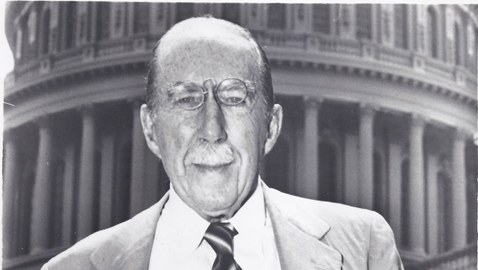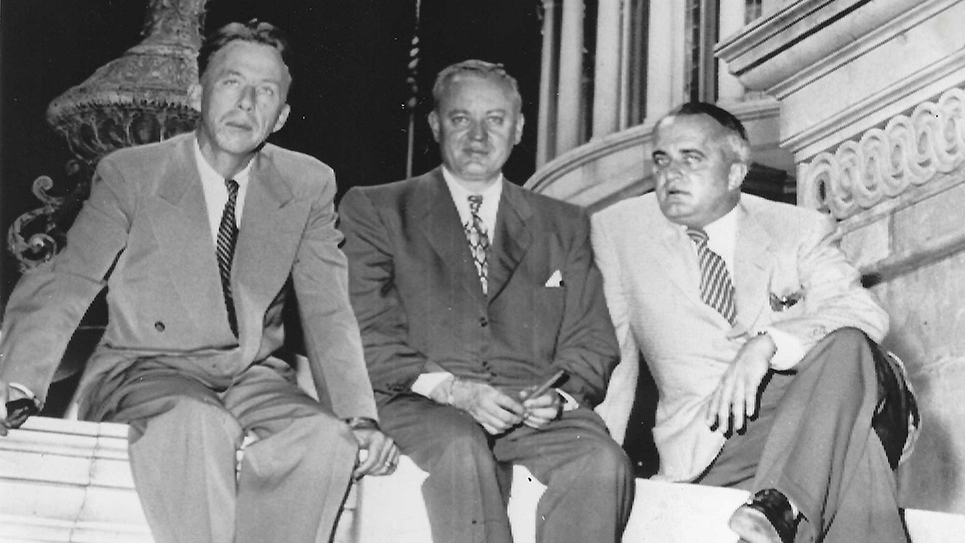Before Strom Thurmond, Theodore Francis Green was well known for some years as being the oldest member of the United States Senate. First elected when he was sixty-nine years old, Theodore Francis Green frustrated several generations of aspiring politicians who figured a vacancy was imminent. Green served twenty-four years in the Senate before retiring in 1961.
Theodore Francis Green was born on October 2, 1867 in Providence, Rhode Island. Green was born into a family that could trace back its origins to a time when Roger Williams had first settled in Rhode Island in 1636. The Greens were quite a wealthy family and Theodore received an education appropriate for the scion of a family rich in heritage and means, graduating from Brown University and Harvard Law School.
Theodore Francis Green practiced law as well as involved himself in several business activities. The political bug didn’t bite Green until he was forty, when he won a seat in the Rhode Island House of Representatives. Green was a Democrat at a time when Republicans dominated Rhode Island politics. Many of the Democrats in Rhode Island were of ethnic extraction, Irish or French, while the staid Yankees were largely Republicans. Theodore Francis Green was an exception to that rule, as was perhaps the most successful Democrat in Rhode Island, Green’s future colleague, Peter Goelet Gerry. The two men had several similarities; both were quite wealthy, both were Yankees, both were willing to spend freely in supporting their own aspirations and both employed shrewd Irishmen as their political secretaries. Despite their similarities, their respective political views were quite different and neither liked the other.
Theodore Francis Green’s attempts to seek public office in his native Rhode Island were frequently thwarted, especially early in his career. Green waged unsuccessful campaigns for governor in 1912, 1928, and 1930. It was not until 1932 that Green finally achieved his ambition to become governor of Rhode Island. The national Republican Party had been damaged politically with the onset of the Great Depression and the party dynamic in Rhode Island was changing. Green managed to defeat Republican incumbent Norman Case by a decisive margin, after having lost to Governor Case just two years previously.
In 1934, Green sought reelection as governor while Peter Gerry attempted to win back his seat in the United States Senate. Both men were successful and it was not long before Governor Green decided to break the power of the state Republican Party. The Rhode Island State Senate had long been dominated by Republicans who represented largely rural areas. Governor Green used a contested election to prove two Republican senators had actually lost, giving Democrats control of the State Senate. Green had decided not to seek a third term as governor, but instead ran for the United States Senate in 1936 against Republican Jesse H. Metcalfe. Metcalfe was also a very wealthy Yankee, known for living on his yacht docked along the Potomac while the Senate was in session. Senator Metcalfe was a very successful industrialist and owned a significant interest in the influential Providence Journal daily newspaper. Green defeated Senator Metcalfe and began yet another career in the Senate.
Green was escorted down the aisle in the Senate Chamber by his senior colleague Peter Gerry. Green, unlike Senator Gerry, was an enthusiastic New Dealer and supported President Roosevelt’s bid to enlarge the United States Supreme Court. Green was also a fervent backer of a third term for Franklin Roosevelt, a notion that appalled Peter Gerry. Until Gerry retired from the Senate in 1947, the two men would bicker over preferment and patronage in Rhode Island. Green likely got the better end of the struggle as his loyalty to Roosevelt gave him a distinct advantage in the rough and tumble of Rhode Island politics, which was usually fierce. Green and his secretary, Edward Higgins, spent considerable time and Green’s money to build an organization that helped keep Senator Green in office for the next several decades. Green was easily reelected in 1942, 1948, and again in 1954 when he was eighty-seven years old.
Theodore Francis Green was not afraid to get ahead of his constituents and his support for FDR’s court packing proposal was likely unpopular with a majority of his constituents and many were skeptical about Green’s support for FDR’s lend lease program, which Green himself referred to as “Aid for America”. Green was a strong proponent of civil rights legislation and was one of the sponsors of legislation to allow servicemen fighting overseas during World War II to cast absentee ballots, a proposal strongly opposed by most Southern senators who feared it would extend voting to African-American soldiers. Green himself supported a great many other bills that were anathema to his Southern colleagues, including efforts to eliminate the poll tax and change the rules of the Senate to make it easier to end filibusters. By any standard, Theodore Francis Green was a steadfast liberal New Dealer.
A lifelong bachelor, Green was quite popular in Washington’s social life and was sought after by hostesses in the nation’s Capitol for dinners and parties. Green, although a millionaire, was known for his frugality, if not downright stinginess. One story told about Senator Theodore Francis Green was how he would occasionally take a cab and refuse to tip the cabbie, although not before slyly encouraging the dismayed cabbie to “Be sure and vote Republican!”
Usually the wealthy Senator Green disdained taxicabs for the less expensive streetcars and could often be observed walking along Washington streets to his destination. Green’s social calendar was so full another often told story about Green is his arriving at a Washington party and looking through a small calendar he kept inside his suit pocket. A woman asked, “Are you looking to see where you’re going next, Senator Green?”, to which the elderly Green murmured, “No, I’m trying to figure out where I am now.”
Theodore Francis Green was a shrewd politician who got considerable press because of his remarkably good health despite his advancing years. When a tribe of American Indians made Green an honorary chief and presented him with an elaborate eagle-feather headdress, Senator Green quickly put the headdress on his head and insisted he be referred to by his new name of “White Buffalo.”
Senator Green was also an enthusiast of exercise, a far less common interest then and frequented the senator’s only gymnasium. Green was also an avid tennis player and continued playing until he finally gave up the sport at age eighty-eight.
One of the few things Theodore Francis Green did not object spending money on was art, especially Chinese art. Green amassed an impressive and large collection of Chinese artifacts throughout his lifetime.
Theodore Francis Green had been assigned to the Senate Committee on Foreign Relations, which became his chief interest while a senator. His office was extremely well run and his faithful secretary Eddie Higgins understood Rhode Island and politics so well, Rhode Islanders received excellent constituent service throughout Green’s tenure in the Senate. Seniority finally brought Green his most cherished goal: the Chairmanship of the Foreign Relations Committee. Assuming the chair in 1957, Green relished the prestige enjoyed by the Chairman of the Foreign Relations Committee, but his age was finally catching up with him. Green needed hearing aids and had stubbornly refused to wear them until it became obvious he could not function properly without them. It soon became obvious to his Senate colleagues that Green was not up to the task of chairing the Foreign Relations Committee and Lyndon Johnson, Democratic Leader of the United States Senate, contrived the means of painlessly removing Green from his committee chairmanship. Johnson appeared at a meeting of the Foreign Relations Committee after having persuaded Green to resign his chairmanship and accept the post of “Chairman Emeritus”. LBJ proceeded to praise Green so fulsomely that the ploy quite nearly backfired on the flamboyant Texan. Johnson pretended to lament the loss of Green’s leadership and perfunctorily bemoaned the fact Green was insistent upon resigning. The elderly Green listened to LBJ’s praise and to Johnson’s horror, announced he was reconsidering his rash action in resigning his committee chairmanship. Senator Green was hustled out of the committee hearing room to a small office and had to be convinced yet again to resign. Senator Green returned to the meeting to firmly insist he thought it better for him to resign his post and assume that of Chairman Emeritus.
Over the twenty-four years Theodore Francis Green served in the United States Senate, a host of potential successors saw their own ambitions frustrated as Green showed not the slightest indication of retiring. Green routinely repeated his goal of being the first senator to seek reelection at the age of one hundred. He quite nearly made it and as his term expired in 1961, observers watched to see what Green would do; if he chose to run again and won, he would be ninety-three years old just weeks before the general election. The Providence Journal, still one of the most influential newspapers in Rhode Island, published an editorial that gently, yet firmly stated Senator Green was no longer fit to serve in the United States Senate and should retire. The editorial apparently both surprised and depressed Theodore Francis Green, it was not long before the old senator announced he was not running for reelection in 1960.
Senator Green retired from the United States Senate and returned to his home in Providence. His health was becoming more fragile, although he made one of the last of his public appearances in 1964 when President Lyndon Johnson came to Rhode Island to campaign. Green sat on the stage, looking very frail and small at ninety-six. The former senator died May 16, 1966 at ninety-eight; had he lived to October, he would have been ninety-nine years old.
The Providence, Rhode Island airport is named for Theodore Francis Green and until Strom Thurmond’s reelection to the Senate at age ninety-four, was frequently still mentioned as the oldest man to serve in the United States Senate.
Although little remembered today, Theodore Francis Green was a genuine power in Rhode Island and an influential member of the United States Senate during some of the most difficult times America has faced in its history.







